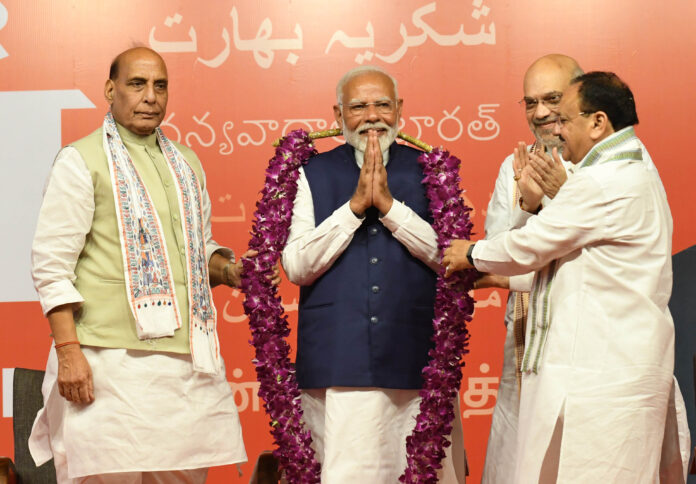
Confounding widespread expectations of a landslide, Narendra Modi’s BJP Party has lost its parliamentary majority, forcing the Islamophobic Prime Minister to negotiate with coalition partners in order to return to power.
With all votes counted early on Wednesday morning, it was clear that there had been a pushback against the PM and his Hindu nationalist politics across the country.
The party lost 62 seats, bringing its total down to 240, below the 272 required for a parliamentary majority.
It is the first time since Modi was elected in 2014 that the BJP has not won a clear majority on its own.
The BJP was hoping to secure over 370 seats and over 400 with the support from its alliance partners, but to the surprise of many, it failed to retain many seats in the Uttar Pradesh, West Bengal and Maharashtra states.
The ruling party was also trailing in Faizabad, where a grand Hindu temple was built at the site of the now demolished 16th-century Babri Mosque. Modi had inaugurated the temple earlier this year.
The BJP is now dependent on its alliance members such as Telugu Desam Party, and Janata Dal (United) to form the government.
Subscribe to our newsletter and stay updated on the latest news and updates from around the Muslim world!
Nonetheless, together with its political allies, known as the National Democratic Alliance (NDA), its win amounts to about 292 seats, which is enough to form a majority government to rule for the next five years and return Modi to office for a third term.
“I bow to the Janata Janardan (People’s verdict) for this affection and assure them that we will continue the good work done in the last decade to keep fulfilling the aspirations of people,” Modi wrote on X in his first remarks since the vote count began earlier in the day.

“I also salute all our Karyakartas (workers) for their hard work. Words will never do justice to their exceptional efforts,” he said.
BJP spokesman Shehzad Poonawalla said the ruling alliance was “comfortably poised to form its government for the third time.” “The BJP has also added and increased its vote share in 2024 as compared to 2019. Clearly this is a vote for pro-incumbency and not anti-incumbency,” he wrote on X.
Meanwhile, the opposition alliance, which goes by the acronym INDIA, far outperformed expectations, collectively winning more than 230 seats. The alliance, formed of more than 20 national and regional opposition parties, had come together for the first time in this election with the aim of defeating Modi.
The main opposition Congress party in India said early results showed “people’s victory” and a mandate against Prime Minister Narendra Modi.
“The result is people’s victory and (the) mandate is against the Prime Minister Narendra Modi,” Mallikarjun Kharge, president of INC, told a news conference. It is a “political and moral defeat” for the ruling party, he added.
Congress leader Rahul Gandhi said “the country has unanimously and clearly said ‘we don’t want Mr. Narendra Modi and Amit Shah to be involved in the running of the country.’”
“’We don’t like the way they have run the country. We don’t appreciate the way they have attacked the constitution’. That is the huge message to Narendra Modi,” he said.
Gandhi said the opposition INDIA alliance will decide its next course of action on Wednesday.
Voting in India was held in seven phases, and final results are expected late on Tuesday evening or Wednesday morning. Counting started after the end of a six-week polling process that began in April.
Discrimination against Muslims in India has increased under the Bharatiya Janata Party (BJP), which has been in power since 2014.
Several instances highlight this trend. The Citizenship Amendment Act (CAA) of 2019, for instance, fast-tracks citizenship for non-Muslim refugees from neighboring countries. Additionally, the National Register of Citizens (NRC) in Assam led to fears of widespread disenfranchisement among Muslims.
Hate crimes and lynchings targeting Muslims have also seen a rise, with perpetrators often facing little consequence. The BJP’s rhetoric emboldens such acts by framing Muslims as outsiders or a threat to national security. Moreover, there are reports of economic and social exclusion, with Muslims finding it harder to secure housing or jobs due to prejudice.
The BJP government denies these allegations, asserting that its policies are inclusive and aimed at national development.





![The History of Sylhet and British Bangladeshis [Short Film]](https://5pillarsuk.com/wp-content/uploads/2024/11/IMG_3518-218x150.png)














